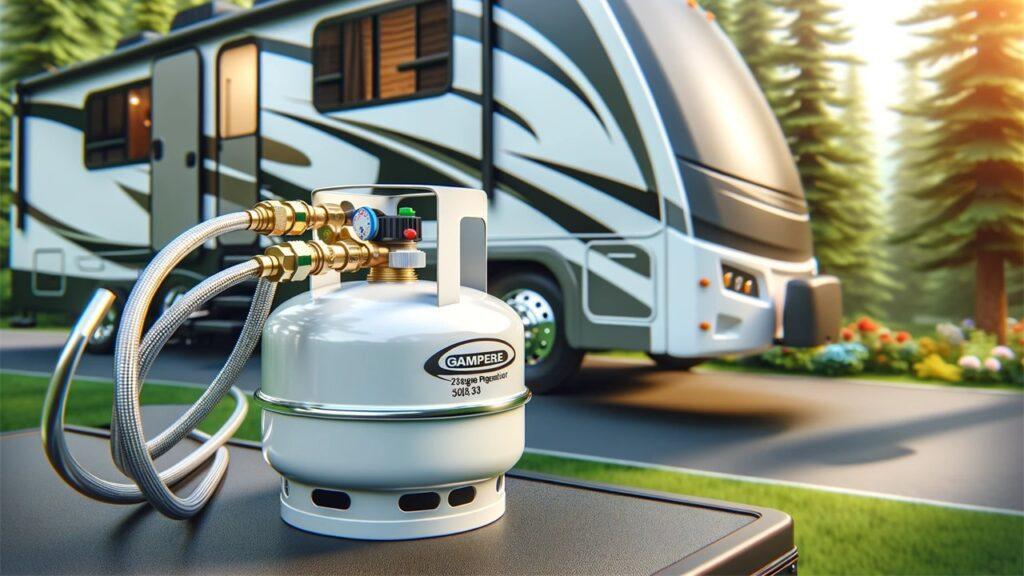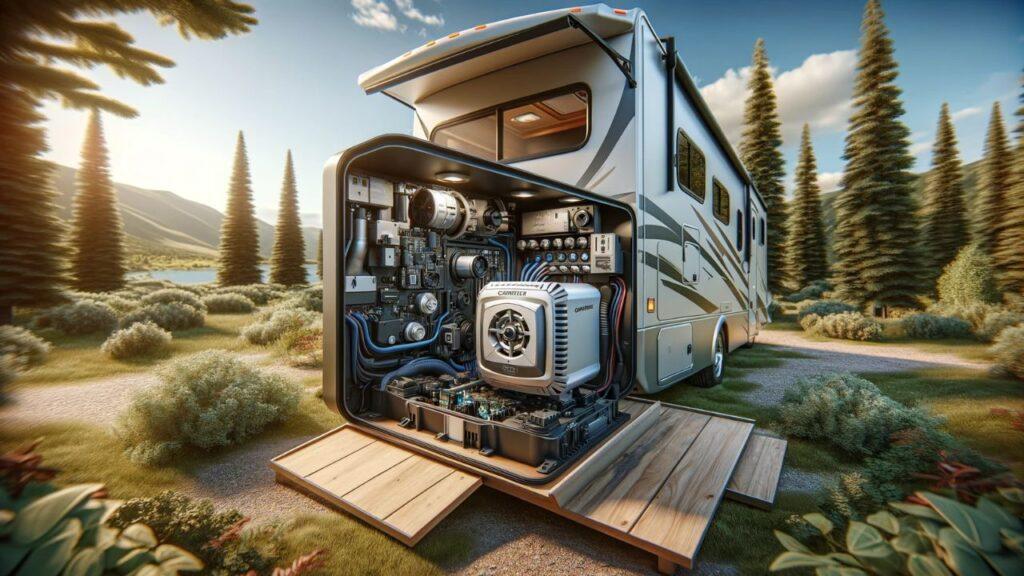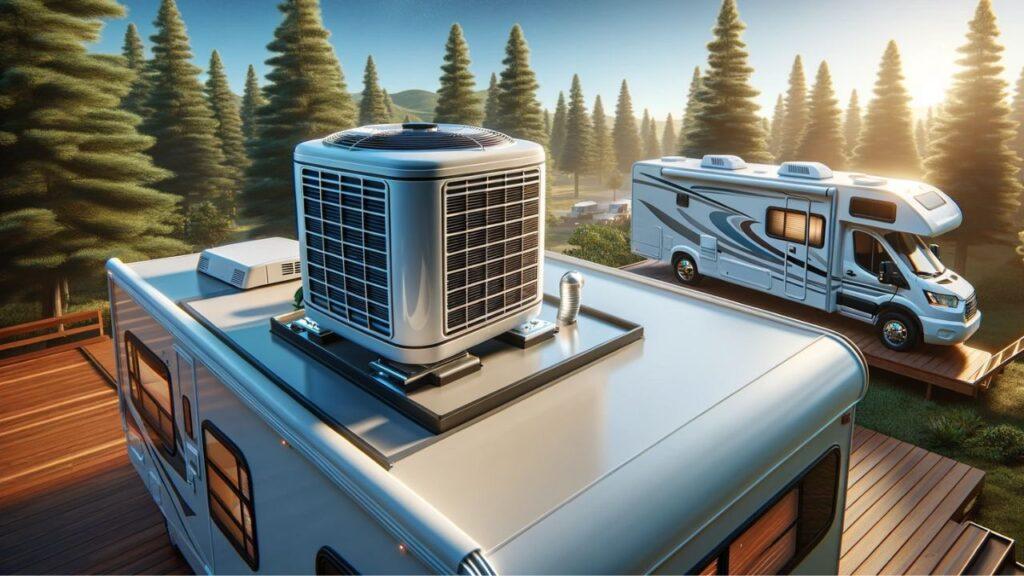Navigating the world of RV travel requires more than just a map and a sense of adventure; it demands efficient and reliable equipment. One such essential component for any RV enthusiast is a robust power inverter. These devices play a pivotal role in transforming the raw energy of your RV’s battery into usable electricity, ensuring all your devices and appliances run smoothly during your travels. In this guide, we have extensively researched, reviewed, and ranked the 5 best RV power inverters for efficiently transforming dc to ac camper van electricity in 2024. This ensures you can choose the right power inverters for your RV from the many choices.
We’re reader-supported. When you buy through links on our site, we may earn an affiliate commission. As an Amazon Associate, we earn from qualifying purchases.
Our Top Picks Of The 5 Best RV Power Inverters for Efficiently Transforming DC to AC Camper Van Electricity In 2024
1. Best Overall: Kinverch 1500W Power Inverter
2. Best Value: JARXIOKE 4000 Watt Power Inverter
3. Best Budget Option: YSOLX 1000W Power Inverter
4. Best Compact Design: Topbull 3000 Watt Power Inverter
5. Best for Easy Installation: Ampeak 2000W Power Inverter
What Is The Best RV Power Inverter for Camper Van Life Power Solutions?
Selecting the best RV power inverter is a crucial decision for any avid traveler. These devices, essential for converting DC to AC power, ensure your journey is as comfortable as it is adventurous. Furthermore, the right inverter not only powers your appliances efficiently but also safeguards your RV’s electrical system. With a myriad of options available, our guide simplifies your choice, focusing on the top inverters that combine performance, reliability, and value.
1. Best Overall: Kinverch 1500W Power Inverter
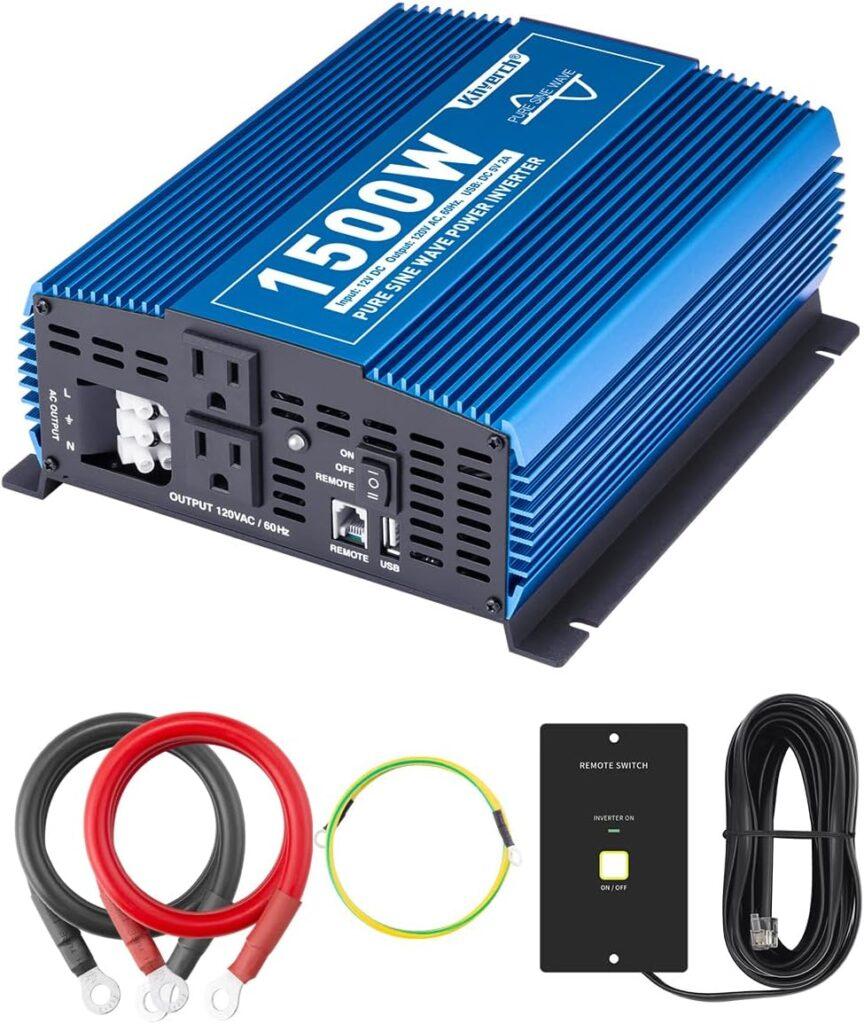
Quick Specifications
- Brand: Kinverch
- Dimensions: 9.25 x 8.27 x 3.54 inches
- Weight: 8.16 pounds
- Power Source: 110v, Battery Powered, Corded Electric
- Wattage: 3000 watts (1500 watts continuous, 3000 watts surge)
In the realm of RV power inverters, the Kinverch 1500W stands out as a top choice. We’ve found it to be an invaluable asset for those seeking reliable power on the go. Its pure sine wave output ensures that your appliances run smoothly and efficiently, a critical feature for any RV enthusiast. Furthermore, its 1500 watt continuous power capacity, bolstered by a 3000 watt surge capability, makes it versatile for a variety of needs, from small devices to larger appliances.
This model’s ease of control is a game-changer, especially with its innovative Bluetooth functionality. It allows you to manage your power needs conveniently from your phone, which is a significant advantage when on the move. Additionally, the unit’s comprehensive safety protections, including over-voltage and overheating safeguards, provide peace of mind, ensuring your travels are as safe as they are enjoyable.
Pros
- High-quality pure sine wave output for stable power.
- Bluetooth functionality for easy control and monitoring.
- Strong safety features, including overheating protection.
- Dual AC outlets and a USB port for versatile charging options.
Cons
- The weight of 8.16 pounds might be slightly bulky for some.
- Limited to 1500 watts continuous power, which may not suit very high-power needs.
The Kinverch 1500W Pure Sine Wave Power Inverter represents the blend of functionality, safety, and convenience. Its robust power output and user-friendly features make it an ideal choice for RV enthusiasts. It’s the perfect companion for ensuring that your devices and appliances are powered efficiently and reliably during your adventures.
2. Best Value: JARXIOKE 4000 Watt Power Inverter


Quick Specifications
- Brand: JARXIOKE
- Power Source: 110v, Battery Cable, Battery Powered, Corded Electric
- Wattage: 4000 watts (8000 watts peak)
- Item Weight: 11.33 pounds
- Output Waveform: Modified Sine Wave
- USB Output: 5VDC, max. 3.4A
In our journey to find the most valuable RV power inverters, the JARXIOKE 4000 Watt Power Inverter has emerged as a standout choice. Its ability to convert DC 12v to AC 110V/120V efficiently makes it perfect for a wide range of outdoor activities, including camping and boating. Furthermore, the convenience of remote control operation, allowing on/off control within 100 meters, enhances its usability in various settings.
The inverter’s comprehensive safety features, such as overvoltage, overload, and overheating protection, give us confidence in its reliability. Moreover, its isolated input/output design and smart cooling fans ensure durability and longevity, crucial for long-term RV use. The LCD display also adds to its user-friendly nature, allowing for easy monitoring of the inverter’s status.
Pros
- High 4000 watts power capacity, suitable for most appliances.
- Remote control functionality for convenient operation.
- Advanced safety features, including overvoltage and short circuit protection.
- Efficient cooling system to prevent overheating and ensure longevity.
Cons
- Weighing 11.33 pounds, it might be slightly heavier for some preferences.
- Modified sine wave output may not be ideal for certain sensitive electronics.
The JARXIOKE 4000 Watt Power Inverter presents itself as the value choice for RV enthusiasts. Its blend of high power capacity, advanced safety measures, and convenient features like remote control and LCD display makes it a top contender for efficiently powering your RV adventures. Its robust build and reliable performance justify its position as the proper value inverter in our selection.
3. Best Budget Option: YSOLX 1000W Power Inverter
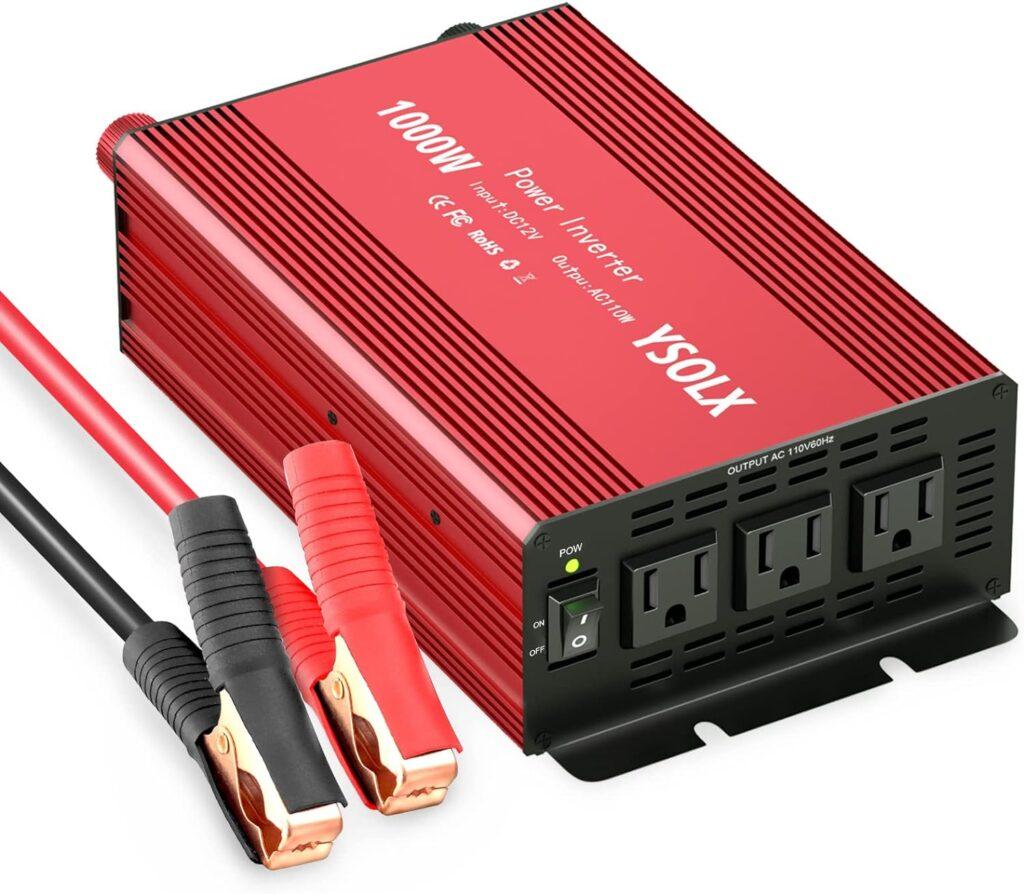

Quick Specifications
- Dimensions: 8.27 x 5.51 x 2.58 inches
- Brand: YSOLX
- Power Source: Battery Powered
- Wattage: 2000 watts peak (1000 watts continuous)
- Model Name: 1000 Watt Inverter
The YSOLX 1000W Power Inverter emerges as an exceptional budget-friendly choice for RV enthusiasts. Despite its modest price, this inverter delivers a reliable 1000 watts of continuous power, with a peak capability of 2000 watts, ideal for a variety of travel needs. It’s compact and lightweight, making it effortlessly portable and convenient for RV life. Moreover, its compatibility with both car and home use amplifies its practicality, especially in outdoor scenarios and emergencies.
What truly sets this inverter apart is its dedication to safety and efficiency. It includes essential features like automatic low battery shutdown and a temperature-controlled cooling fan, ensuring your devices and RV’s battery are safeguarded against common power issues. Additionally, the inverter’s ease of use, with simple setup and operation, makes it a favorite among RV owners who prioritize functionality and value.
Pros
- Exceptionally affordable, offering great value for money.
- Versatile usage for both RV and home, enhancing its utility.
- Comprehensive safety features to protect devices and battery life.
- Compact design for easy storage and transport.
Cons
- Not ideal for powering high-wattage appliances like electric heaters.
- Larger inductive appliances may require a more powerful inverter.
In our opinion the YSOLX 1000W Power Inverter stands out as the right budget option in the RV power inverter category in our list. Its combination of affordability, versatile functionality, and robust safety features make it a wise choice for those seeking an efficient and reliable power solution without a hefty price tag.
4. Best Compact Design: Topbull 3000 Watt Power Inverter
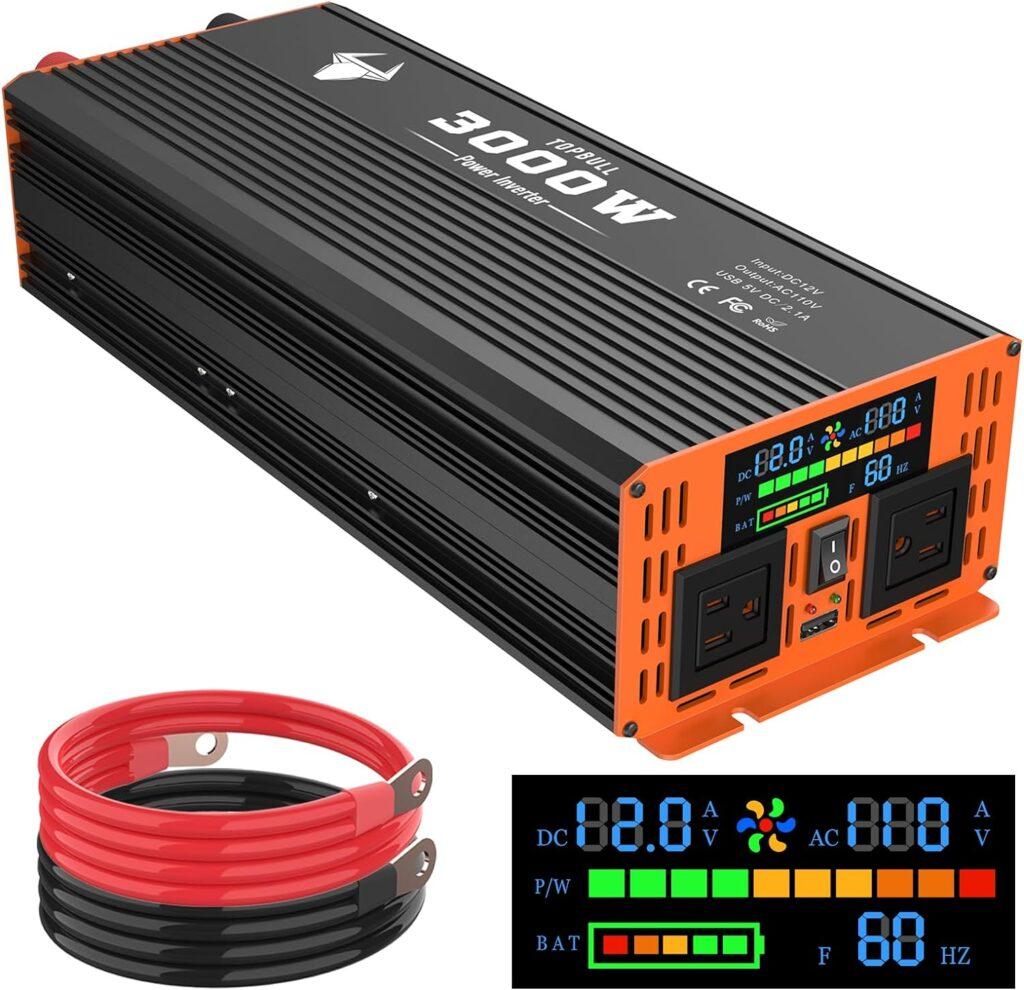

Quick Specifications
- Dimensions: 14.3 x 5.9 x 3.45 inches
- Weight: 7.96 pounds
- Brand: TOPBULL
- Power Source: Battery Powered
- Wattage: 3000 watts (6000 watts peak)
- Included Components: 4 AWG Battery Cable
The Topbull 3000 Watt Power Inverter impresses with its compact design, yet packs a powerful punch with its high wattage capacity. Its ability to deliver a continuous 3000 watts of power, peaking at 6000 watts, makes it a reliable partner for RV enthusiasts. Furthermore, its durable construction and thoughtful design cater to a broad range of power needs, especially in confined spaces.
We appreciate the inverter’s 6-fold safety protection, which covers everything from undervoltage to short circuit, ensuring a secure power supply. The integrated dual smart fans are a testament to its intelligent design, keeping the device cool while minimizing noise. Additionally, the large LED display enhances user experience, providing clear and accessible information about power usage.
Pros
- Compact and robust design for easy storage and longevity.
- High continuous wattage suitable for various appliances.
- Advanced safety features for reliable power conversion.
- Large LED screen for convenient monitoring of power status.
Cons
- At 7.96 pounds, it might be slightly heavier for some users.
- The peak power of 6000 watts may not be necessary for all users.
The Topbull 3000 Watt Power Inverter stands out as the right option for those seeking a compact yet powerful inverter. RV users who prioritize efficiency and convenience will find this product to be an outstanding choice due to its blend of high-power output, safety enhancements, and user-friendly features such as the LED display and intelligent cooling system.
5. Best for Easy Installation: Ampeak 2000W Power Inverter
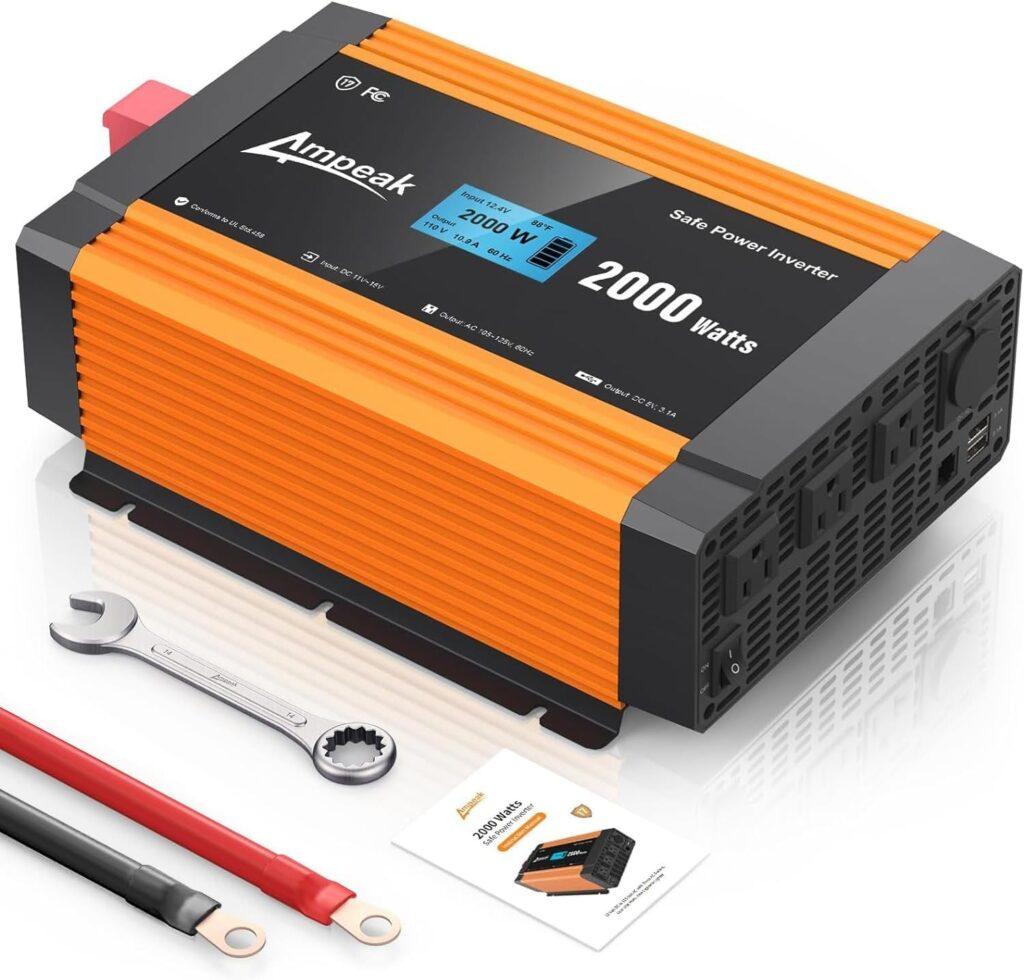

Quick Specifications
- Dimensions: 11.02 x 7.28 x 3.46 inches
- Weight: 7.5 pounds
- Brand: Ampeak
- Recommended Uses: Hurricanes, Power Outages, RV, Vehicle
- Power Source: Battery Powered
- Wattage: 2000 watts (4000 watts peak)
- Battery Capacity: 200 Amp Hours
The Ampeak 2000W Power Inverter is a standout in the realm of compact and efficient power solutions for RVs. It provides a substantial 2000 watts of continuous power and can surge up to 4000 watts, making it adept at handling a wide range of appliances and electronics. Furthermore, its size and design make it an ideal choice for RV enthusiasts who prioritize space-saving without compromising on power.
What we particularly appreciate about this inverter is its array of features tailored to RV use. The integration of 17 safety protections is a commendable aspect, ensuring that your devices and the inverter itself remain secure under various conditions. Additionally, the inverter’s LCD display offers real-time monitoring, a feature that enhances user convenience and control. The silent, temperature-controlled fan is another thoughtful addition, keeping noise to a minimum while ensuring the unit stays cool.
Pros
- High power output in a compact design, ideal for RV use.
- 17 safety protections, offering peace of mind.
- User-friendly LCD display for easy monitoring.
- Smart temperature-controlled fan, balancing cooling with quiet operation.
Cons
- Weighing 7.5 pounds, it may be considered slightly heavy for some users.
- The real output of 1760 watts (considering efficiency) may not suit the highest power demands.
The Ampeak 2000W Power Inverter is an excellent choice for those seeking a compact yet powerful inverter. Its combination of high wattage, multiple safety features, and user-friendly design aspects make it a top pick for RV owners looking for reliable, space-efficient power solutions.
Understanding Power Inverters for RVs Needs
In the dynamic world of RV travel, understanding the role and necessity of power inverters is crucial. These devices are not just mere accessories but are pivotal in transforming your RV into a comfortable, functional mobile home. Furthermore, with the rise in popularity of van life, nomadic lifestyles, and off-grid living, the significance of reliable power inverters has never been more apparent.
What are Power Inverters?
At their core, power inverters are devices that convert DC (Direct Current) from your RV battery into AC (Alternating Current), the standard form of power for most household appliances. Typically, RV batteries operate on 12V or 24V DC, whereas home appliances require 110V or 220V AC, depending on your location. This conversion is essential for using everyday devices like laptops, kitchen appliances, and entertainment systems in your RV.
Moreover, inverters come in various types, like pure sine wave and modified sine wave, each catering to different power needs and appliance sensitivities. It’s important to consider factors like wattage capacity, peak power rating, and energy efficiency when selecting an inverter. Such considerations ensure that your campervan kitchen, portable Wi-Fi, and other essential gadgets function seamlessly.
Why Power Inverters are Essential for RVs
Power inverters are indispensable for the RV lifestyle. They not only provide the convenience of home comforts while on the road but also ensure safety in powering devices. For full-time RV living, having a reliable power source means you can maintain a mobile office, access digital nomad tools, and ensure essential campervan electrics are running smoothly.
Moreover, in situations like boondocking or stealth camping, where access to a power grid is unavailable, an inverter is your lifeline. It allows for off-grid power generation, especially when paired with solar panels or dual-fuel generators, creating a sustainable and autonomous living environment. Additionally, for families or individuals who enjoy remote travel, inverters ensure that RV batteries and backup power systems are efficiently utilized, enhancing campervan layout flexibility and travel trailer comforts.
Power inverters are more than just a convenience for RV users; they are a necessity for anyone who values autonomy and comfort in their mobile living space. They not only facilitate a range of activities from RV cooking to maintaining outdoor recreation equipment but also enhance the overall RV experience. As the demand for RV travel and outdoor adventures grows, so does the importance of selecting the right power inverter to meet your unique travel needs.
Types of Power Inverters for RVs
In your pursuit of preparing your RV for the ultimate road trip or off-grid living, it’s crucial to grasp the various types of power inverters available. These essential devices, responsible for converting DC power from your RV’s battery into AC power, come in diverse forms, each tailored to specific needs and appliances. Furthermore, the right choice of inverter can profoundly influence your RV’s energy efficiency and the longevity of your electronic gadgets.
Pure Sine Wave Inverters
Pure sine wave inverters stand as the pinnacle in the realm of power inverters, particularly for RV applications. They generate a smooth, consistent waveform that mirrors the electricity you’d find in a standard household outlet. These inverters are exceptionally well-suited for operating sensitive electronic equipment like laptops, smartphones, medical devices, and appliances equipped with variable-speed motors.
Moreover, their efficiency in converting power is notable, a crucial factor in maximizing the utility of RV batteries and solar setups. Pure sine wave inverters also operate quietly, a substantial advantage for individuals who cherish a serene living environment in their RV or camper. Nonetheless, this top-tier performance comes at a higher price point, making them a significant investment in enhancing your RV’s electrical infrastructure.
Modified Sine Wave Inverters
Conversely, modified sine wave inverters present a more budget-friendly solution. They produce a simplified form of AC power that suits many basic appliances and tools. This type of inverter is an excellent match for less delicate electronics, such as basic kitchen appliances, lighting, and chargers. Modified sine wave inverters are favored by RV enthusiasts seeking a dependable power source but may not possess a multitude of sensitive gadgets necessitating a pure sine wave.
Nevertheless, it’s essential to recognize that these inverters may occasionally pose compatibility issues with more sensitive devices, potentially leading to inefficiencies or gradual damage. Their affordability makes them the go-to choice for newcomers to the RV lifestyle or those adhering to a budget.
Pure Sine Wave vs. Modified Sine Wave Inverters
When weighing the merits of pure sine wave and modified sine wave inverters, the crux lies in comprehending your precise power requirements. Pure sine wave inverters provide the closest emulation of typical household AC power, ensuring the safety and efficiency of delicate electronics.
This is paramount for individuals who rely on their RV for full-time living, engage in digital nomadic activities, or depend on medical devices. Conversely, modified sine wave inverters capably power less sensitive devices, rendering them suitable for intermittent RV usage or individuals with modest power needs.
The decision also hinges on cost considerations, with pure sine wave inverters carrying a higher price tag but delivering superior efficiency and electronic protection. Ultimately, your choice depends on your RV’s specific power demands, financial constraints, and the nature of the electronic devices you intend to power during your travels.
The selection of the right power inverter holds immense significance for every RV owner. Whether you opt for a pure sine wave inverter for its efficiency and electronics safeguarding or a modified sine wave inverter for its budget-friendliness, comprehending these distinctions is pivotal for a gratifying RV experience. As the popularity of RVing continues to soar, investing in the appropriate inverter ensures that your adventures are powered effectively, safely, and aligned with your unique lifestyle requisites.
Do You Need Power Inverters for Your RV?
When embarking on an RV adventure, the question of whether a power inverter is a necessity or a luxury often arises. It’s not merely a matter of convenience; it’s a pivotal element of the RV experience, especially for those venturing off-grid or embracing a nomadic lifestyle. To determine if a power inverter is essential for your RV, it’s crucial to comprehend its role and assess your power requirements.
The Role of Power Inverters in RVs
In the realm of RVs, power inverters play a critical role by transforming DC (Direct Current) from your RV’s battery into AC (Alternating Current), the standard power form used in most household appliances. This conversion is indispensable for individuals who intend to utilize regular appliances, such as kitchen gadgets, TVs, or computers, while on the move. For avid RV enthusiasts, it translates into the ability to convert their vehicle into a comfortable and fully functional living space, regardless of their parking location.
Additionally, power inverters come in various types, such as pure sine wave and modified sine wave, each tailored to specific applications. A pure sine wave inverter is a must for running sensitive electronics, ensuring their seamless operation without interference or potential damage. Conversely, a modified sine wave inverter may suffice for less delicate appliances. Those invested in solar setups or off-grid power solutions find an efficient inverter indispensable, as it maximizes the utility of solar panels and battery storage.
Evaluating Your RV’s Power Needs
Determining the necessity of a power inverter for your RV begins with a thorough assessment of your power requirements. This assessment entails examining the types of appliances and devices you plan to use and their corresponding power demands. For example, if your RV lifestyle involves the use of microwaves, air conditioners, or essential tools like laptops and cameras, a power inverter becomes an integral part of your setup.
Moreover, consider the duration and nature of your trips. For brief getaways with minimal appliance usage, a basic inverter may suffice. However, for extended travels or full-time RV living, a more robust inverter is imperative to handle heightened power demands. It’s also crucial to evaluate the compatibility of your chosen inverter with other components of your RV’s electrical system, such as RV batteries and solar panels, to ensure a seamless and efficient power supply.
Power inverters hold a fundamental role in elevating the RV experience beyond mere convenience. They are the linchpin for ensuring comfort, convenience, and efficiency on the road. Whether you embark on occasional getaways or embrace a permanent RV lifestyle, selecting the right power inverter is a decision that significantly influences the quality of your travel and living. Hence, a careful evaluation of your power needs and a thorough understanding of inverter functions are vital for making an informed choice that harmonizes with your RV adventures.
Do You Need Power Inverters for Your RV?
Venturing into the great outdoors in an RV brings a unique set of challenges and comforts. Among these, the need for reliable power stands paramount. Whether you’re a digital nomad seeking a mobile office setup or a family enjoying a campervan getaway, the right power solutions can transform your experience. This leads us to the question: Do you really need power inverters for your RV?
The Role of Power Inverters in RVs
Power inverters play a crucial role in the RV lifestyle. These devices convert DC power from your RV batteries into AC power, enabling the use of everyday appliances. For those living the full-time RV living dream or enjoying a weekend van camping, this means access to home comforts like 12V appliances, RV kitchen amenities, and even RV air conditioners. The convenience of having a solar generator or a dual-fuel generator is enhanced with a quality inverter, making off-grid living more accessible.
Inverters are not just about comfort; they are about necessity. From powering RV water systems to maintaining a campervan electric system, inverters ensure that critical systems are operational. This is especially important for those who engage in stealth camping or boondocking, where traditional power sources are unavailable. Furthermore, for the nomadic lifestyle enthusiasts who depend on portable Wi-Fi and mobile charging stations, inverters are indispensable.
Moreover, the variety in inverters is vast. From compact generators for minivan campers to high-wattage generators for luxury motorhomes, there’s an inverter to suit every need. Those with solar setups might lean towards solar charge controllers and pure sine wave inverters, ensuring efficient and stable power. The evolution of inverters has kept pace with the diverse needs of RV owners, from campervan conversion enthusiasts to luxury motorhome travelers.
Evaluating Your RV’s Power Needs
Determining your RV’s power requirements is the first step in choosing the right inverter. This involves a careful assessment of your energy consumption and generator wattage needs. For instance, a full-time RV living enthusiast might have different requirements compared to someone who indulges in occasional van life getaways.
Begin by listing all your power-dependent devices, from RV appliances to personal gadgets. This helps in calculating the total watt-hour (Wh) and peak power needs. Remember, an RV onboard generator or a portable generator must meet these demands comfortably. For those relying on solar power, understanding solar wattage and the capacity of your battery bank is crucial.
Moreover, consider the type of travel you prefer. Boondocking and stealth camping often require a self-sufficient setup, possibly a dual-fuel generator or a solar generator with a robust campervan power supply. Alternatively, if you frequently stay at RV parks or campgrounds, your reliance on an inverter may be less.
It’s also essential to factor in voltage regulators and power efficiency. A campervan solar setup might need a solar charge controller, while a motorhome might benefit from an inverter charger. In essence, your RV’s power solution should align with your travel style, appliance needs, and the type of campervan or motorhome you own.
Power inverters are more than just a convenience in the world of RVs; they’re a necessity for a comfortable and safe journey. Whether you’re embarking on a nomadic adventure or living the RV lifestyle, understanding the importance of inverters and evaluating your power needs is key to a seamless experience. The shift towards sustainable travel with solar generators and energy-saving appliances highlights the evolving nature of RV travel. In the end, the right inverter not only powers your journey but also enriches your on-the-road experiences, ensuring that every adventure is as comfortable as it is memorable. With careful consideration and the right setup, your RV can become a true home away from home, powered efficiently and effectively for whatever the road may bring.
How To Choose The Right Power Inverter for Your RV
Embarking on an RV adventure requires not just a spirit of exploration but also the right gear. A crucial component of this gear is the power inverter. It’s essential for transforming your RV into a comfortable, efficient home on wheels. Selecting the right inverter is not just about power; it’s about harmonizing your RV’s electrical system with your lifestyle needs.
Assessing Your Power Requirements
The first step in choosing the right power inverter is understanding your RV’s power needs. This involves calculating the total wattage of appliances and devices you plan to use. For full-time RV living, power needs might include RV air conditioners, 12V appliances, and campervan kitchen gadgets. On the other hand, occasional van life adventurers might prioritize mobile charging stations or portable Wi-Fi.
It’s important to consider both peak power and continuous power demands. High-wattage appliances, even if used infrequently, can dictate the need for a more robust inverter. Additionally, the choice between a solar generator or dual-fuel generator can impact inverter selection, especially for those inclined towards eco-friendly RV accessories and sustainable travel.
Matching Inverter Type to Appliances
Not all inverters are created equal, and their type can significantly affect your RV experience. Pure sine wave inverters are ideal for sensitive electronics and high-end appliances, ensuring smooth and stable power. They are a match for luxury motorhomes with sophisticated systems. Conversely, modified sine wave inverters might suffice for basic needs in a minivan camper conversion or DIY camper build.
The key is to match the inverter with the appliances’ requirements. For example, a campervan solar setup might benefit more from a pure sine wave inverter to maximize solar panel efficiency. RV lifestyle enthusiasts with heavy-duty power needs, such as those using RV water systems or campervan heating, should consider inverters that can handle these larger loads.
Budget Considerations
Budget plays a pivotal role in the selection process. While it might be tempting to opt for cheaper models, remember that inverters are an investment in your RV’s electrical health. Affordable options might suffice for compact travel or minimalist van living, but they might not provide the reliability needed for full-hookup camping or luxury motorhomes.
Balancing cost with quality is key. Look for inverters that offer the best value within your budget, considering energy efficiency, durability, and warranty. For those on a strict budget, prioritize features essential for your RV lifestyle, like generator auto start or RV energy monitoring.
Choosing the right power inverter for your RV is a balance of understanding your needs, matching these needs to the appropriate inverter type, considering your budget, and researching brands and models. This careful consideration ensures that your RV adventures, whether they involve stealth camping or enjoying luxury motorhomes, are powered effectively and efficiently, enhancing your overall experience on the road.
Efficiency and Power Management in RVs
In the realm of RV living, managing your power efficiently is not just a convenience; it’s a necessity. With the right power inverters and management strategies, you can ensure that your RV batteries last longer and your campervan electrics function optimally. This section explores how to maximize the efficiency of your power inverters and implement effective power management strategies for an enjoyable RV experience.
Maximizing Efficiency of Power Inverters
The efficiency of a power inverter is pivotal in determining how well your RV utilizes its power. High-efficiency inverters ensure that the power drawn from RV batteries or solar setups is converted with minimal loss. To maximize efficiency, it’s crucial to select the right type of inverter, be it a pure sine wave or a modified sine wave, based on your RV’s power needs and the types of appliances you use.
Understanding the peak power and continuous power ratings of your inverter is essential. An inverter that can handle the peak power demands of appliances like RV air conditioners or microwaves without straining is ideal. Furthermore, integrating solar generators or dual-fuel generators with your inverter can enhance your system’s overall efficiency, especially for full-time RV living or off-grid living.
Regular maintenance of your inverter and connected systems also plays a crucial role. This includes monitoring energy consumption, checking for any voltage drops, and ensuring that all connections, especially in a campervan solar setup or RV electrical system, are secure and efficient.
Power Management Strategies for RV Living
Effective power management in an RV is about more than just having a good inverter; it’s about strategically using and conserving power. This involves understanding and monitoring your daily power usage, which includes keeping track of generator run time, energy consumption, and battery levels. Utilizing RV energy monitoring systems can provide real-time insights into your power usage, helping you make informed decisions.
One key strategy is prioritizing your power usage. Identify which appliances and devices are essential, like RV water systems or RV refrigerators, and which can be used sparingly. For boondocking or stealth camping enthusiasts, this is particularly crucial to extend the life of your power reserves.
Another strategy is to invest in energy-saving appliances and LED lighting. These not only reduce the load on your inverter but also extend the life of your RV batteries. Additionally, for those with solar setups, maximizing sunlight exposure and regularly maintaining your solar panels can significantly boost your power reserves.
In situations where shore power is available, such as in RV parks or campgrounds, balancing the use of external power sources with your RV’s own system can help in managing your energy reserves better. This also includes understanding when to use your RV generator versus when to rely on battery power.
Efficient power management in an RV is a blend of using the right power inverters, understanding your energy needs, and implementing strategic power usage practices. Whether you’re living the RV lifestyle full-time or are an occasional adventurer, mastering these aspects ensures that your journey is smooth, comfortable, and uninterrupted by power issues. With the right approach, you can enjoy all the comforts of home, even on the road.
Common Misconceptions About RV Power Inverters
Common misconceptions about RV power inverters can often lead to confusion and inefficiency in their usage. A prevalent myth is that all inverters are essentially the same, irrespective of their type and specifications. However, the reality is that power inverters vary significantly in terms of wattage capacity, output type, and efficiency ratings.
For instance, many believe a modified sine wave inverter is universally sufficient, overlooking that pure sine wave inverters are often necessary for sensitive electronics and certain appliances in luxury motorhomes or high-end campervan conversions.
This oversight can lead to damage to appliances or inadequate power supply. Another common fallacy is that inverters drastically drain RV batteries. While inverters do use battery power, modern inverters are designed for high efficiency, and proper usage, especially when coupled with a balanced solar setup or dual-fuel generators, can minimize this drain.
There’s also a misconception that inverters alone can suffice for all power needs. In reality, inverters are part of a larger RV electrical system, which includes battery banks, generator systems, and sometimes, external shore power sources. Understanding how these components work together is crucial for efficient energy management in an RV. Finally, some RV owners underestimate the importance of matching the inverter with their specific power requirements, leading to issues like voltage drops or power inefficiencies.
It’s essential to assess your RV’s power needs accurately, considering both continuous and peak power demands, to select an inverter that complements your RV’s lifestyle, be it full-time RV living, boondocking, or occasional van life adventures.
Advanced Tips and Tricks for Using Power Inverters in RVs
Navigating the world of RV power inverters can be complex, but with some advanced tips and tricks, you can significantly enhance your experience. Understanding how to effectively use your inverter not only ensures a steady power supply but also extends the lifespan of your RV’s electrical system. Let’s delve into some advanced strategies for optimizing power inverter usage and tackling common power challenges faced in RVs.
Enhancing Power Inverter Usage
To make the most out of your power inverter, it’s essential to understand its full capabilities and limitations. One advanced tip is to regularly monitor the inverter’s energy consumption and efficiency levels. This can be done through RV energy monitoring systems, which provide valuable insights into power usage and help in making adjustments for optimal performance. Additionally, for those using solar generators or dual-fuel generators, aligning the inverter’s load capacity with the generator’s output can prevent power wastage and ensure a seamless energy flow.
Another tip is to strategically manage the appliances connected to the inverter. Prioritize essential appliances, like RV refrigerators or campervan heating systems, to avoid overloading the inverter. Utilizing energy-saving appliances and LED lighting can also reduce the strain on your inverter. Moreover, for full-time RV living or extended van life journeys, consider installing a power inverter with a higher continuous power rating to accommodate increased energy needs.
Innovative Solutions for Power Challenges
Facing power challenges in an RV is inevitable, but innovative solutions can significantly ease these issues. One such solution is integrating a battery management system. This system can optimize the battery bank usage, ensuring that power is drawn efficiently and the batteries’ lifespan is maximized. For those relying on solar power, adding a solar charge controller can improve the efficiency of solar panels, thus enhancing the overall solar setup.
Innovative solutions also include the use of smart power strips and RV power management systems. These tools allow for better control over which appliances are drawing power and when, helping to manage energy consumption more effectively. For boondocking enthusiasts, investing in a portable battery bank or a car battery booster can provide an additional power source during prolonged off-grid adventures.
Additionally, exploring the use of inverters with auto start features can be beneficial. This feature automatically manages the inverter’s operation based on the connected load and battery levels, providing a hassle-free experience, especially for those new to the RV lifestyle.
By employing these advanced tips and innovative solutions, you can significantly enhance the functionality and efficiency of your RV power inverter. Whether you are a seasoned RV camper or a newbie to the van life community, understanding and implementing these strategies can lead to a more enjoyable and worry-free experience. Remember, the key to a successful RV journey lies in the smart management of your resources, and your power inverter is at the heart of this management.
Wrapping It Up!
The journey through the world of RV power inverters reveals its undeniable importance in the realm of RV living. A reliable power inverter is the cornerstone of a comfortable, efficient RV experience, whether you’re engaged in full-time RV living, boondocking, or occasional van life adventures.
Throughout this exploration, we’ve emphasized the critical role inverters play, from converting DC power to running campervan electrics seamlessly. We’ve tackled how to choose the right inverter, delved into efficiency enhancement, and discussed innovative solutions for common power challenges.
Furthermore, this article has highlighted the need for careful consideration of power needs, budget constraints, and brand reliability. The essence of enjoying a worry-free RV adventure lies in the efficient management of power resources, with the power inverter at its core. In conclusion, investing in a high-quality power inverter is not just a technical necessity but a gateway to enriching your RV experience, ensuring that every journey is powered safely and efficiently. This is essential for anyone aspiring to embrace the RV lifestyle or the freedom of nomadic living.
Related FAQs
What Is the Main Function of a Power Inverter in an RV?
A power inverter in an RV converts DC power from the RV’s batteries to AC power for regular household appliances.
How Do I Determine the Right Size of Power Inverter for My RV?
Calculate the total wattage of your appliances and add a buffer to choose an inverter with a suitable wattage capacity.
Can I Run Air Conditioning on a Power Inverter in My RV?
Yes, but ensure the inverter has a high enough wattage capacity to handle the air conditioner’s power requirements.
Are Pure Sine Wave Inverters Better for RVs?
Yes, pure sine wave inverters are better for sensitive electronics and offer more efficient and consistent power output.
How Does a Power Inverter Impact My RV’s Battery Life?
Power inverters draw from your RV’s batteries; efficient usage and proper sizing can minimize battery drain.
As outdoor enthusiasts ourselves, we understand the significance of reliable gear that can withstand the elements and support you throughout your journey. We try to provide as much real life information with our guides and how tos to the readers as possible. Our honest and transparent reviews of essential outdoor gadgets and products are rooted in testing and experience. We take great satisfaction in offering unbiased evaluations, ensuring that you can make informed decisions when investing in outdoor gear. As an affiliate website, we may earn a small commission from some of the products we feature. However, rest assured that our opinions are not influenced by this, and your trust is always our top priority.

